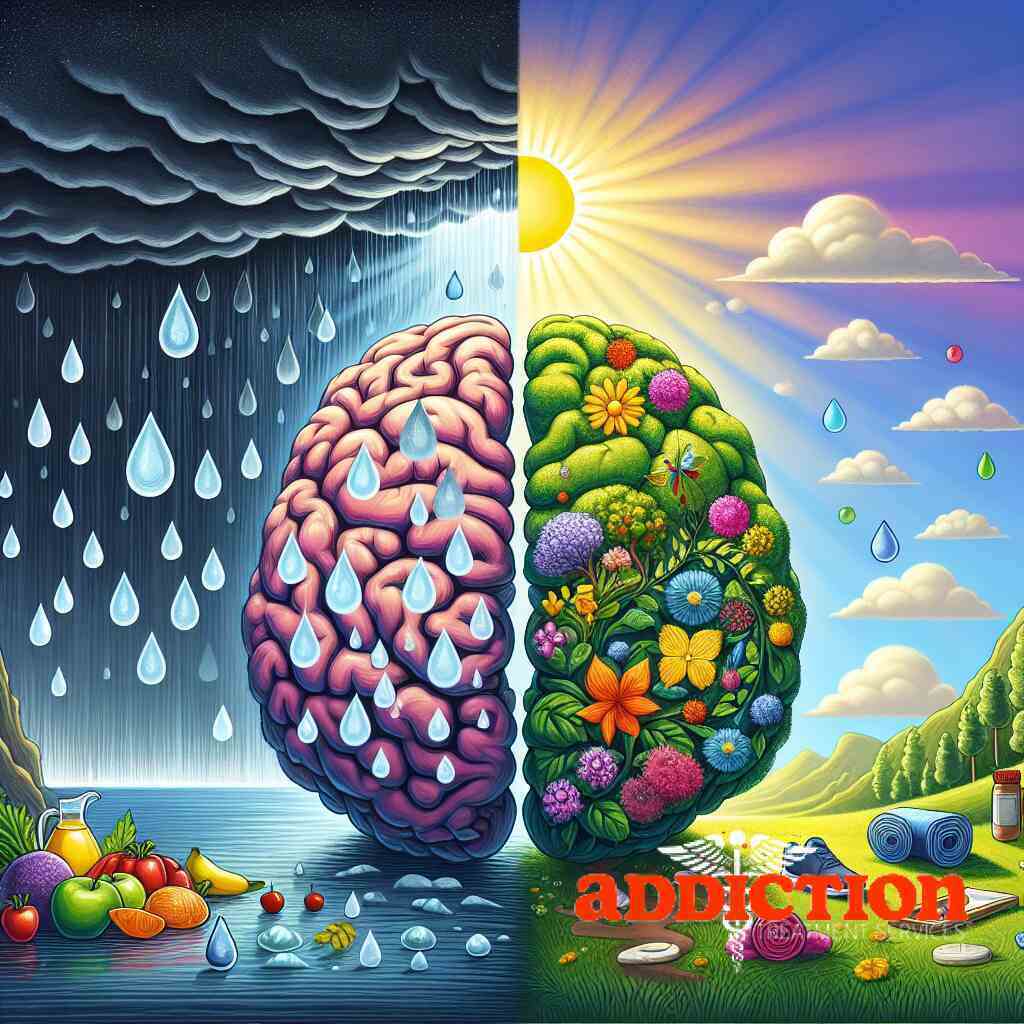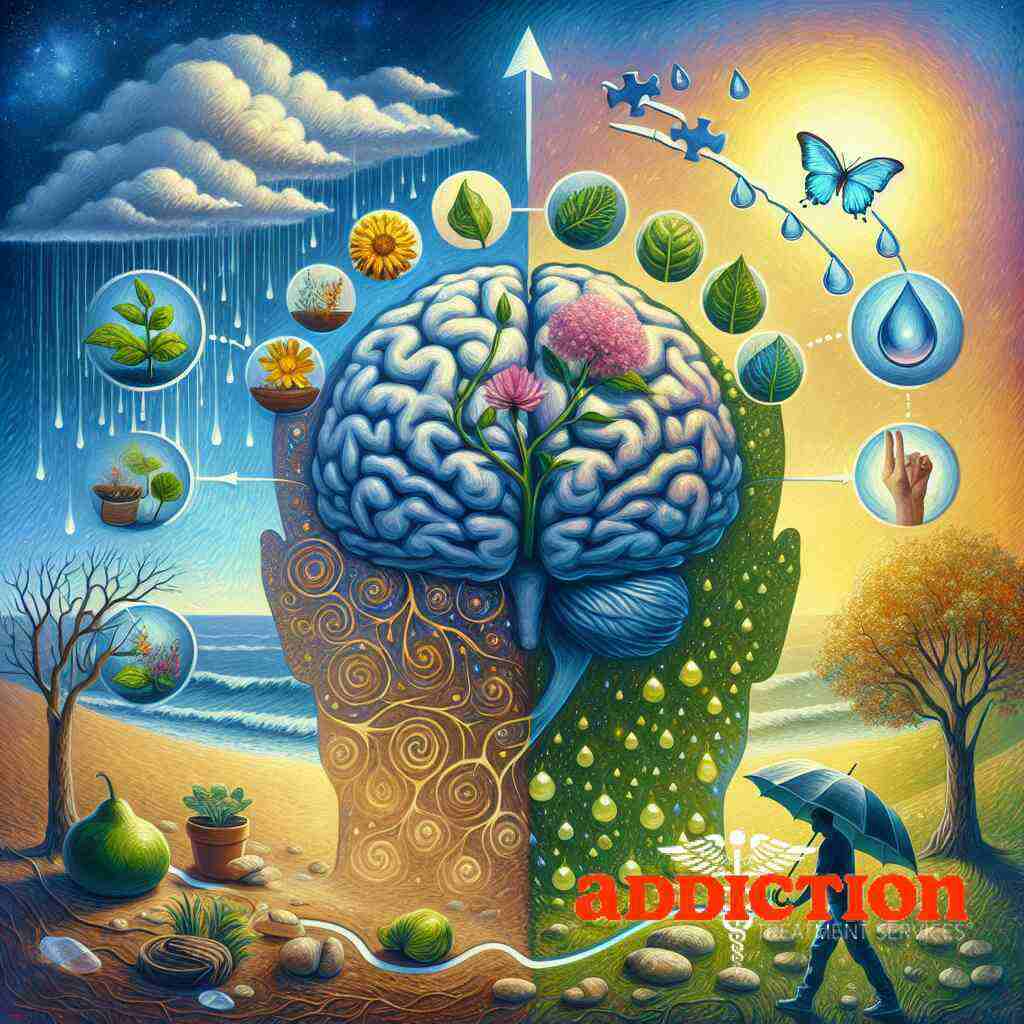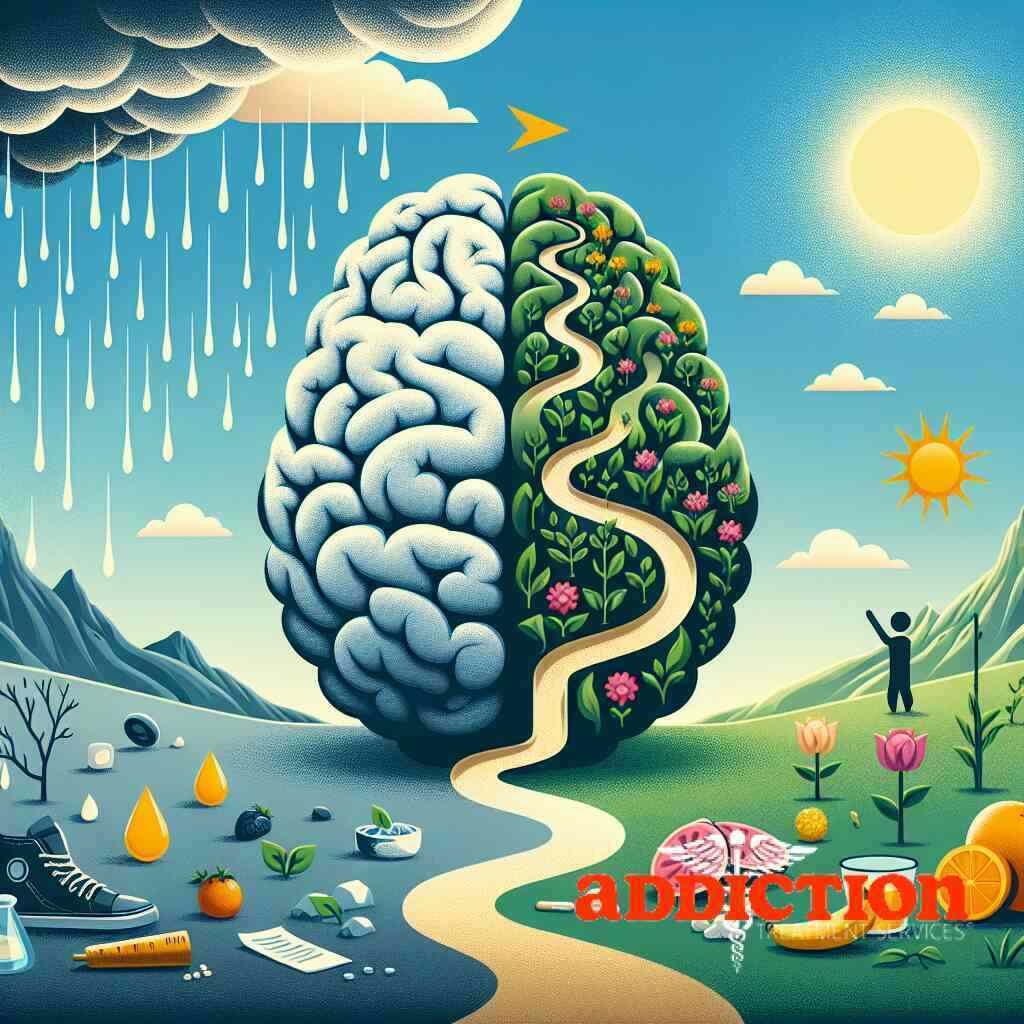 Posted On: 07/01/2024
Posted On: 07/01/2024Understanding Addiction and Brain Rewiring
The neuroscience behind substance use disorders
The journey of overcoming addiction and the process of brain rewiring is a complex one, rooted deeply in the neuroscience of substance use disorders. At the core of addiction lies a fundamental alteration in the brain’s chemistry and functioning. Substances of abuse can hijack the brain’s reward system, leading to the compulsive use of drugs or alcohol despite adverse consequences. This dependency is not merely a matter of willpower but is underscored by significant changes in the brain’s structure and operations, making the path to recovery a challenging yet entirely possible endeavor.
The concept of neuroplasticity in addiction recovery
A pivotal concept in the field of addiction recovery is neuroplasticity, the brain’s remarkable ability to reorganize itself by forming new neural connections throughout life. This adaptability is a beacon of hope for those recovering from addiction, suggesting that the brain can “rewire” itself to overcome substance use disorders. Neuroplasticity underlines the brain’s potential to heal and adapt in response to actions, thoughts, and experiences, underscoring the importance of therapeutic interventions and lifestyle changes in fostering brain recovery and facilitating long-lasting sobriety. Incorporating an understanding of neuroplasticity in overcoming substance use is crucial for developing effective treatment strategies that support the brain’s natural healing processes.
Key factors influencing brain recovery after addiction
Several key factors play a role in influencing the brain’s recovery after addiction, including the severity and duration of substance use, the type of substance abused, and individual differences in brain structure and genetics. Additionally, the presence of accompanying mental health disorders, the quality and extent of treatment received, and the strength of a person’s support network can all significantly impact the recovery trajectory. Engaging in evidence-based treatment programs, adopting a healthy lifestyle, and accessing ongoing support can help maximize the brain’s ability to rewire and heal from the effects of addiction, laying a strong foundation for a sober and healthy life.
The Early Stage of Recovery: What to Expect
Initial withdrawal symptoms and the brain’s response
The early stages of recovery from addiction mark a critical window of physical and psychological adjustments. Individuals embarking on this journey often confront initial withdrawal symptoms that can range from mild to severe, depending on the substance used, the duration of use, and the individual’s health history. These symptoms may include anxiety, irritability, intense cravings, mood swings, and physical discomforts, symbolizing the brain’s intense response to the absence of the addictive substance.
During this period, the brain begins to adapt to the lack of external stimuli provided by drugs or alcohol. This adjustment period is crucial as the brain starts to rewire itself, reverting back to a state before dependency. Understanding that these withdrawal symptoms are temporary and a sign of the brain’s recovery can provide some comfort and perspective during these challenging times.
The role of detoxification services in starting the brain healing process
Detoxification services play a pivotal role in the early stages of recovery, providing a medically supervised environment for safely managing withdrawal symptoms. These services can mitigate the risks associated with withdrawal by offering medication-assisted treatment to alleviate symptoms, [monitoring vital signs](https://en.wikipedia.org/wiki/Drug_det, and ensuring the individual’s safety throughout the detox process. This initial step is critical in starting the brain’s healing process, clearing the way for further rehabilitation and recovery efforts.
Engaging with reputable centers that offer detox services in addiction recovery is vital. These facilities are equipped with the expertise and resources to support individuals through the withdrawal phase, establishing a foundation for the brain’s rewiring and long-term recovery.
Early intervention and its importance in rewiring the brain
Early intervention following the recognition of substance use issues can significantly influence the effectiveness of the brain’s rewiring and recovery process. Engaging in a comprehensive treatment program shortly after deciding to cease substance use maximizes the potential for a successful recovery by addressing the addiction in its nascent stages.
Programs that incorporate cognitive-behavioral therapy, medication-assisted treatment, and other evidence-based approaches can facilitate the process of brain recovery by establishing new, healthy patterns of thought and behavior. These strategies are designed not only to help manage withdrawal symptoms and cravings but also to tackle the underlying causes of addiction, thereby supporting the brain in developing new, healthier neural pathways.
The journey of recovery from addiction is a testament to the resilience and plasticity of the human brain. Despite the challenges of initial withdrawal symptoms and the need for detoxification, early intervention plays a crucial role in setting the stage for successful brain rewiring. As individuals navigate these early stages, the support of addiction treatment services and the commitment to a comprehensive treatment plan can pave the way for a brighter, substance-free future.
Evaluating the Timeline: How Long Does Brain Recovery Take?
General timelines for brain recovery after addiction
The duration required for the brain to recover from addiction varies significantly among individuals and the type of substance abused. Recovery can be a long-term process, often taking several months to years for neural pathways to adjust and for cognitive functions to improve. Generally, a critical period in the initial months of abstinence involves profound brain changes that can improve over time. During this time, individuals may experience a gradual return of cognitive functions such as memory, attention, and emotional regulation. Research suggests that certain changes in brain function, particularly those related to the brain’s reward system, may begin to reverse within a matter of weeks or months after cessation of drug use. However, complete recovery, where the brain functions as it did before addiction, may take significantly longer and requires sustained effort and support.
Individual variability in the brain healing process
The process of brain recovery after addiction is highly individualized, depending on numerous factors including the substance used, the duration and severity of addiction, genetic predispositions, and overall health. Personal lifestyle choices during recovery, such as nutrition, exercise, and engagement in cognitive challenges, also play a crucial role in the brain’s healing process. Additionally, the presence of co-occurring mental health disorders can influence the timeline and success of recovery. It’s important for individuals to work closely with addiction recovery services near me to create a comprehensive and personalized recovery plan. This plan should address not only the physical aspects of addiction but also the psychological, emotional, and social factors that contribute to substance use disorders.
Case studies on addiction recovery timeline
Case studies on addiction recovery provide valuable insights into the timelines and strategies that can support brain recovery. Individual stories highlight the variability and potential for healing, with some experiencing significant improvements in a few months, while others demonstrate gradual recovery over several years. For instance, a case study might detail the journey of a person battling alcohol addiction, illustrating the initial challenges faced during detoxification and the gradual improvement in cognitive functions and emotional well-being through participation in an intensive outpatient program. These narratives underscore the importance of personalized treatment plans and the incorporation of holistic care strategies, including cognitive-behavioral therapy in addiction treatment, which has been evidenced to support neural recovery and reduce the likelihood of relapse. Through these case studies, the message is clear: Recovery is a deeply personal journey, full of ups and downs, but with the right support and resources, healing and rewiring the brain from addiction is achievable.
Treatment Strategies for Enhancing Brain Recovery
Cognitive-behavioral therapy and its effect on neural pathways
Cognitive-behavioral therapy (CBT) is a cornerstone in the treatment of substance use disorders, empowering individuals to identify and modify detrimental thoughts and behaviors. Its efficacy lies in its structured approach to problem-solving, which directly targets neural pathways associated with addiction. By fostering the development of new, healthier thought patterns, CBT facilitates profound changes in the brain’s structure and function. Engaging in CBT can stimulate neuroplasticity, the brain’s ability to rewire itself, encouraging recovery from the cognitive distortions and decision-making deficits often exacerbated by substance abuse. Through consistent therapy sessions, patients learn coping mechanisms to manage triggers and cravings, effectively redirecting their neural circuitry towards more adaptive responses to stress and environmental cues. This reprogramming of thought and behavior patterns is pivotal in consolidating recovery and reducing the likelihood of relapse, making CBT an integral part of the holistic addiction cure insights.
Medication-assisted treatment for brain recovery
Medication-assisted treatment (MAT) represents another crucial strategy in the arsenal against addiction, especially when combined with psychotherapy and counseling. By utilizing medications to stabilize brain chemistry, alleviate withdrawal symptoms, and diminish cravings, MAT addresses the physiological aspects of substance use disorders. Drugs such as methadone for opioid addiction or naltrexone for alcohol and opioid dependency work by normalizing brain chemistry, blocking the euphoric effects of substances, or mitigating withdrawal distress. This approach not only supports the initial detoxification process but also aids in maintaining long-term sobriety by preventing relapse. As the brain gradually heals and readjusts to the absence of the abused substance, MAT can significantly improve cognitive functioning and emotional regulation, offering a foundation from which individuals can more effectively engage in behavioral therapies and recovery activities.
Intensive outpatient programs and their role in neurorehabilitation
Intensive Outpatient Programs (IOPs) provide a structured, comprehensive approach to addiction recovery, bridging the gap between residential care and standard outpatient treatment. By offering a rigorous schedule of therapy sessions, skill-building workshops, and support groups, IOPs facilitate sustained engagement in the recovery process while allowing participants to live at home and maintain their daily responsibilities. This level of care is particularly beneficial for individuals in the intermediate stages of recovery, who require more support than traditional outpatient services can offer but do not need round-the-clock supervision. IOPs emphasize relapse prevention, mental health management, and the development of healthy coping mechanisms, all of which are critical for rewiring the brain from addiction. The consistent therapeutic contact and peer support found in IOPs encourage the reinforcement of new neural pathways associated with sobriety, contributing to the intensive outpatient program benefits in addiction healing. Through participation in an IOP, individuals gain the tools and community support necessary to navigate the complexities of recovery and support long-term brain health.
Lifestyle Adjustments to Support Brain Healing
Developing a Sober Lifestyle and Its Benefits on Brain Function
The adoption of a sober lifestyle is a transformative factor in the process of rewiring the brain after addiction. Embracing sobriety goes beyond the abstinence from substances,it involves a holistic overhaul of one’s lifestyle, encompassing physical health, mental well-being, and social interactions. Engaging in activities that promote sobriety, such as participation in community support groups like Alcoholics Anonymous meetings for support or Narcotics Anonymous, can significantly enhance an individual’s resolve and success in maintaining a substance-free life. The benefits of a sober lifestyle on brain function are profound and multifaceted, ranging from improved cognitive abilities and emotional stability to enhanced neuroplasticity. This environment, free from the influence of substances, allows the brain to heal and form new, healthy neural connections, which are crucial for recovery and long-term sobriety.
Nutrition, Exercise, and Sleep in Restoring Brain Function After Drugs
The trilogy of nutrition, exercise, and adequate sleep forms the cornerstone of physical health and, by extension, brain recovery from substance abuse. Nutritional interventions can replenish depleted stores of essential vitamins and minerals, supporting neurotransmitter function and overall brain health. A balanced diet rich in omega-3 fatty acids, antioxidants, and lean proteins promotes neurogenesis and reduces inflammation, facilitating cognitive recovery.
Regular physical activity is another pillar supporting brain healing. Exercise not only improves blood flow to the brain, aiding in the delivery of vital nutrients, but also triggers the release of endorphins, the body’s natural mood elevators. This can be particularly beneficial in counteracting the depression and anxiety often associated with early recovery.
Sleep, often disrupted by addiction, is vital for cognitive processes and emotional regulation. Establishing a regular sleep pattern enhances memory, learning, and the ability to manage stress, all of which are crucial for successful brain rewiring. Together, these lifestyle adjustments create a conducive environment for the brain to heal and regenerate, paving the way for successful recovery.
Mindfulness and Stress Management Techniques for Brain Health
Mindfulness and stress management techniques are invaluable tools in the journey of addiction recovery, aiding significantly in the rewiring of the brain. Practices such as mindfulness meditation, yoga, and deep-breathing exercises foster a state of mental clarity and calm, reducing stress levels and improving emotional regulation. The regular practice of these techniques can diminish the brain’s stress-response, which is often heightened in individuals recovering from addiction. By focusing on the present moment and developing a heightened awareness of thoughts, feelings, and bodily sensations, individuals can learn to navigate triggers and cravings more effectively.
Moreover, these practices enhance neuroplasticity-the brain’s ability to form new neural connections-by promoting relaxation and reducing the negative impact of stress on the brain. This not only aids in the direct recovery from the neurochemical imbalances caused by substance use but also contributes to improved coping strategies, emotional resilience, and overall well-being. Engaging in mindfulness and stress management can significantly accelerate the brain’s healing process, making it a critical component of a holistic recovery plan.
Long-Term Recovery and Maintenance of Brain Health
Relapse Prevention and Sustaining Neural Changes
Long-term recovery involves continuous effort and the implementation of strategies to prevent relapse while sustaining the neural changes achieved during initial treatment. Relapse prevention is a critical component of recovery, focusing on identifying triggers, developing coping strategies, and reinforcing the new neural pathways that support sober living. By engaging in activities that promote brain health, such as ongoing therapy sessions, mindfulness practices, and healthy lifestyle choices, individuals can maintain the neuroplastic changes that support sobriety. Additionally, staying connected with support networks and being proactive in managing stress and emotional challenges are vital for sustaining recovery. These practices not only help in preventing a return to substance use but also contribute to overall mental and physical well-being, underlining the importance of a holistic approach to long-term recovery.
Ongoing Support Systems: From Recovery Support Services to Sober Living Communities
The journey towards sobriety doesn’t end with the completion of a treatment program,ongoing support is crucial for maintaining the gains made during recovery. Incorporating recovery support services, such as continuing therapy with mental health professionals in drug rehab, attending Narcotics Anonymous meetings for addiction support, or participating in alumni programs, can provide the accountability and encouragement necessary to navigate the challenges of long-term sobriety. Similarly, transitioning into a sober living environment can offer a supportive and structured setting that reinforces the lifestyle changes essential for sustained brain health. These communities act as a bridge between intensive treatment and independent living, offering residents ongoing support, connection, and a sense of belonging. Together, recovery support services and sober living communities play a pivotal role in facilitating successful long-term recovery, ensuring individuals have access to the resources and support systems that encourage continued growth and healing.
Engaging with Addiction Recovery Services for Continuous Care
One of the most effective strategies for ensuring long-term recovery and maintenance of brain health is continuous engagement with addiction recovery services. By leveraging resources like the addiction treatment centers near me, individuals can access a variety of post-treatment services designed to support sustained recovery. These might include ongoing counseling, booster sessions, recovery coaching, or wellness programs tailored to address the unique challenges faced during the maintenance phase of recovery. Engaging with these services provides not only a safety net in moments of vulnerability but also a source of motivation and guidance as individuals navigate the complexities of a sober lifestyle. Addiction Treatment Services, with its comprehensive directory and resources, plays a critical role in connecting individuals with the right services to support their long-term recovery goals. Continuously accessing these services empowers individuals to maintain their commitment to sobriety, reinforce their resilience against relapse, and enjoy a fulfilling life in recovery.
Innovations and Future Directions in Addiction Neurorehabilitation
Emerging Research on Addiction Rewiring Techniques
The realm of addiction treatment is witnessing groundbreaking advances, particularly in the development of novel rewiring techniques. Scientists are exploring the intricacies of neuroplasticity-the brain’s ability to reorganize itself by forming new neural connections-in the context of addiction recovery. This emergent research focuses on harnessing the brain’s innate capacity for change to counteract the neural pathways that reinforce substance dependency. Innovative approaches, such as cognitive training exercises and neurofeedback, are part of an evolving toolkit aimed at enhancing the brain’s recovery process. These techniques strive to improve cognitive functions, reduce cravings, and bolster emotional regulation, offering hope for more effective and personalized treatment strategies.
The Role of Technology in Supporting Addiction Treatment Services
Technology plays a pivotal role in advancing addiction treatment and expanding access to crucial resources. Digital platforms, including telehealth services and mobile apps, are revolutionizing the way treatment is delivered and experienced. These technological innovations enable real-time, personalized support for those in recovery, breaking down barriers to accessing care. For instance, applications that monitor mood and cravings can provide immediate coping strategies, fostering resilience against triggers in daily life. Furthermore, online platforms offer a wealth of addiction therapy and rehabilitation blogs, guiding both individuals and families through the complexities of recovery. As technology continues to evolve, its integration into addiction treatment services promises enhanced care coordination, sustained engagement in recovery programs, and improved outcomes for individuals grappling with substance use disorders.
Future Prospects: Neural Implants and Virtual Reality Therapies
Looking ahead, the frontier of addiction neurorehabilitation is set to be transformed by the advent of neural implants and virtual reality (VR) therapies. These futuristic techniques embody the next leap in addiction treatment, promising interventions that directly influence brain activity and experiential therapies that immerse individuals in controlled environments tailored to address triggers and stressors. Neural implants, for instance, may offer precision targeting of brain regions implicated in addiction, potentially moderating cravings and withdrawal symptoms through electrical stimulation. On the other hand, VR therapies provide a safe and customizable platform for practicing coping skills and exposure therapy, thereby enhancing emotional and psychological resilience in real-world scenarios. Together, these advancements signify a new era of addiction treatment-one rooted in a deep understanding of brain science and leveraged by cutting-edge technology, positioning the field on the cusp of breakthroughs that could fundamentally alter the landscape of substance abuse rehabilitation and recovery.
Concluding Thoughts on Addiction Recovery and Brain Healing

Reaffirming the Journey of Healing and Recovery
The journey of healing from addiction is both profoundly challenging and deeply rewarding. It is a testament to the human spirit’s resilience and the brain’s incredible capacity for change and healing. Neuroplasticity, the cornerstone of the brain’s ability to rewire itself, offers a foundation of hope and possibility for anyone embarking on the path of recovery. As we’ve explored, this journey is not linear,it is filled with ups and downs, successes and setbacks. Yet, each step forward in the process of overcoming substance use and rewiring the brain is a milestone in its own right, deserving of recognition and celebration.
How Addiction Treatment Services Can Facilitate Your Recovery Path
Addiction Treatment Services stands as a beacon of support and guidance for those navigating the complexities of addiction recovery. With a vast directory of reputable addiction treatment centers, including detox services, outpatient and residential therapy centers, and specialized programs, ATS provides the much-needed clarity in finding the right support for your unique journey. Our focus on connecting individuals with the most suitable environment for their recovery underlines our commitment to promoting long-term healing and sobriety. Whether you’re taking the first step towards recovery or seeking to reinforce your path to sobriety, Addiction Treatment Services offers a comprehensive resource for every stage of the healing process.
Empowering Messages for Those in the Process of Rewiring Their Brain from Addiction
To those in the midst of their recovery journey, remember that your path is uniquely yours. The process of rewiring your brain from addiction is a profound testament to your strength, courage, and willingness to embrace change. As challenging as this path may be, each day brings you closer to reclaiming your life and your potential. Embrace the support systems available to you, from family and friends to recovery communities and professional services. Celebrate each victory, no matter how small, and know that setbacks are not failures but opportunities for growth. Your journey is one of transformation, not just of your brain, but of your entire being.
You are not alone in this journey. Addiction Treatment Services and the vast network of professionals and peers are here to support you every step of the way. Together, we can navigate the challenges, celebrate the triumphs, and move forward towards a future defined not by addiction, but by resilience, healing, and hope.
Frequently Asked Questions
Question: What is neuroplasticity and how does it relate to the journey of overcoming substance use disorders?
Answer: Neuroplasticity is the brain’s incredible ability to reorganize itself by forming new neural connections, a foundational concept in both neuroscience and the recovery process from substance use disorders. At Addiction Treatment Services, we focus on leveraging this capability through a variety of treatment programs that encourage brain recovery after addiction. By engaging in evidence-based therapies like cognitive-behavioral therapy, medication-assisted treatment, and lifestyle adjustments, individuals can harness neuroplasticity to overcome the neurological impacts of addiction. Our holistic approach to treatment is designed to support the rewiring of the brain from addiction, fostering a solid ground for long-term recovery.
Question: What factors determine the timeline for brain recovery after addiction, and how does Addiction Treatment Services support this journey?
Answer: The timeline for brain recovery after addiction is influenced by several factors, including the duration and severity of addiction, the type of substance used, and individual health and lifestyle habits. At Addiction Treatment Services, we understand that each person’s journey is unique, which is why we offer personalized treatment plans that take into account these variables. Our addiction treatment centers provide a comprehensive range of services from detoxification to intensive outpatient programs, all aimed at enhancing the brain’s natural healing process. By addressing both the psychological and physiological aspects of addiction, we help individuals navigate the recovery process at a pace that respects their unique timeline for healing.
Question: How does Addiction Treatment Services integrate cognitive-behavioral therapy and medication-assisted treatment in aiding the brain’s recovery from addiction?
Answer: At Addiction Treatment Services, we recognize the power of combining cognitive-behavioral therapy (CBT) with medication-assisted treatment (MAT) in the battle against addiction. CBT plays a pivotal role in rewiring the neural pathways associated with addiction by helping individuals identify and change harmful thought patterns and behaviors. When paired with MAT, which stabilizes brain chemistry and eases withdrawal symptoms, the effectiveness of the recovery process is significantly enhanced. Our treatment centers specialize in this integrated approach, applying the latest research in neuroplasticity and addiction neurorehabilitation to support not just the overcoming of substance use but the comprehensive healing of the addicted brain.
Question: In the blog post ‘How Long to Rewire Brain from Addiction?’, the concept of a sober lifestyle is emphasized. How does adopting a sober lifestyle benefit brain function and recovery?
Answer: Adopting a sober lifestyle is crucial for facilitating brain recovery and enhancing overall brain function after addiction. This lifestyle change supports the re-establishment of healthy neural pathways, bolstering neuroplasticity and the brain’s ability to adapt post-addiction. At Addiction Treatment Services, we highlight the importance of a holistic recovery plan that encompasses not just abstinence from substances but also incorporates healthy eating, regular exercise, adequate sleep, and mindfulness practices. These lifestyle adjustments complement our therapeutic interventions, providing an optimal environment for the brain to heal and thrive. Embracing a sober lifestyle thus becomes a transformative factor in restoring brain function and achieving a fulfilling, substance-free life.
Question: How does Addiction Treatment Services help individuals in the long-term maintenance of brain health and prevention of relapse?
Answer: Long-term maintenance of brain health and relapse prevention are critical components of the recovery journey, which Addiction Treatment Services supports through continuous engagement and comprehensive aftercare programs. We offer a range of recovery support services, including ongoing counseling, access to sober living communities, and involvement in recovery groups, which together create a supportive network for sustaining the neural changes achieved during treatment. By providing these resources, we ensure that individuals have the tools and support necessary to navigate life post-recovery, maintaining their brain health and resilience against relapse. Our commitment to each person’s long-term well-being is a testament to our belief in a holistic and sustained approach to recovery.



